There’s a cascade of colour throughout Chile’s capital as people occupy street corners and flow onto the central avenue. Their cries are backed by a chorus of banging pots and pans from surrounding buildings, the traditional cacerolazo protest.
Yet Santiago is marked by violence of the night before: the smell of teargas clings to the concrete, the sidewalks have been turned into rubble beside burnt-out buildings. Security vehicles pass, shooting water to disperse protesters, while news of more wounded spreads through communities.
The first videos that began to circulate after protests started on 18th October were of a wounded schoolgirl who had been shot in the leg by police. Soon smartphones thousands of miles away were flooded with messages alleging police brutality.
“I started getting Whatsapp messages in the middle of the night,” says Carole Concha Bell, a writer from Cambridge, England. “It was a fear of, shit, this is happening again. It rocked my world, I couldn’t eat or sleep for the first three days.”
Concha Bell is the daughter of Chilean exiles. Her grandfather worked for the socialist president Salvador Allende, before a bloody military coup overthrew the government and began a 30-year dictatorship. Her grandfather was imprisoned and sent to a concentration camp, like thousands of others detained, tortured and disappeared under the Augusto Pinochet regime.
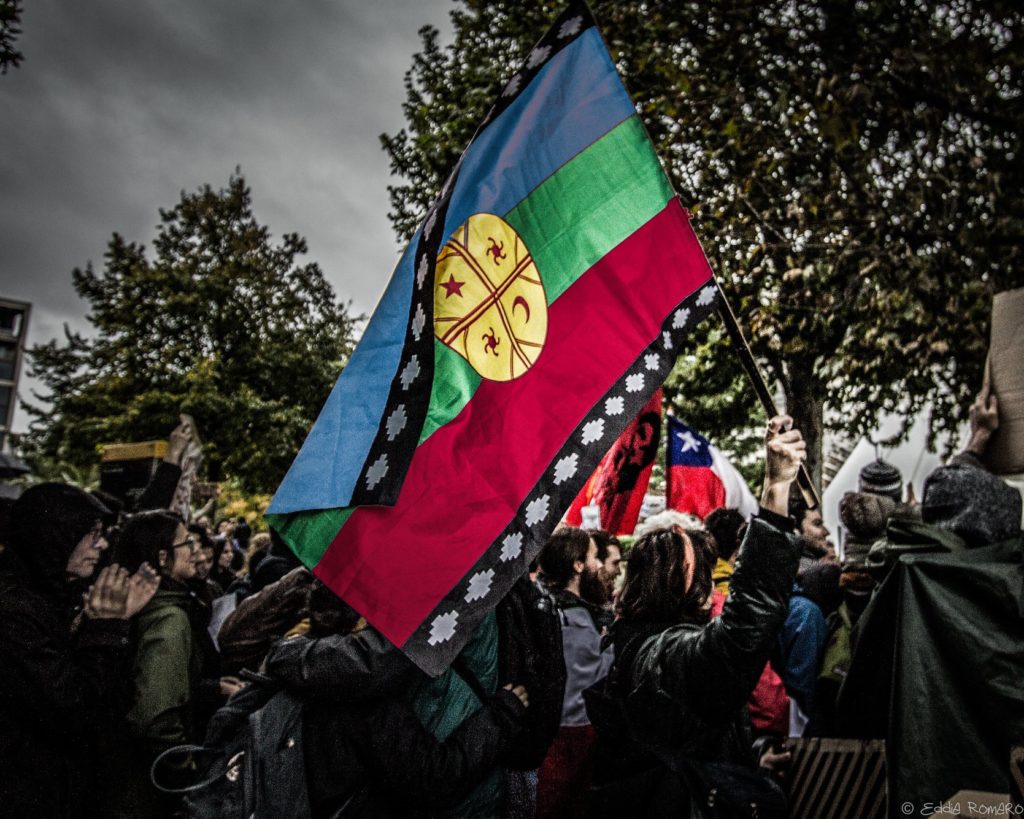
When the state began cracking down on last year’s historic uprising, it opened deep wounds for many Chileans. After an explosion of protests brought widespread vandalism and looting, President Sebastián Piñera issued a state of emergency and brought the military out on the streets – echoing the years of life under the military junta.
“I’m concerned about human rights. Many of us are relatives of people who were tortured and murdered in that time,” Concha Bell says.
Chile has been living in a democracy since 1990, but the legacy of the Pinochet regime is imprinted across society. The 1980 Constitution remains, with only a few amendments over the years, and is seen as the basis of a neoliberal model that many blame for the inequality that pervades Chilean life today.
The architecture of the economic system leads us back to the Chicago Boys, a group of Chilean exchange students who travelled to the US to study economics with the aim of returning to discourage socialism-inspired ideas. Pinochet quickly promoted these economists to ministerial positions, who promoted the belief that poverty could be eradicated by growth. The model prioritized a market-driven economy but failed to adequately guarantee healthcare, education and pensions.
Although on paper Chile is the most prosperous country in Latin America and has been hailed as an economic success story, it is one of the most unequal among the 36 countries that make up the Organisation for Economic Co-operation and Development. The president is a billionaire, but most earn less than $6600 a year. A 2018 government study showed the richest Chileans had an income nearly 14 times greater than the poorest.
Last year’s 30 peso (3 cents) rise in Santiago’s metro fares, which brought peak prices to 830 pesos (just over a dollar) was the catalyst for what would become a months-long social uprising. It was the second time the fare had been increased that year, making it the most expensive public transit system in Latin America, in a country where average monthly wages were stagnant at $350 per month. This came just weeks after a 10 percent increase in electricity bills, nationwide.
Months of protest hit pause for pandemic
School students staged a mass fare evasion in October, then people of all ages and backgrounds began to take to the streets to protest inequality and the high cost of living. People across the country called out low wages, private pension systems, the privatization of healthcare and education, Indigenous and women’s rights, and greater environmental protection.
It was the most sustained and violent protests in the country’s living memory, and sent shockwaves around the world. But in some ways, had long been Chileans gearing up for an explosion.
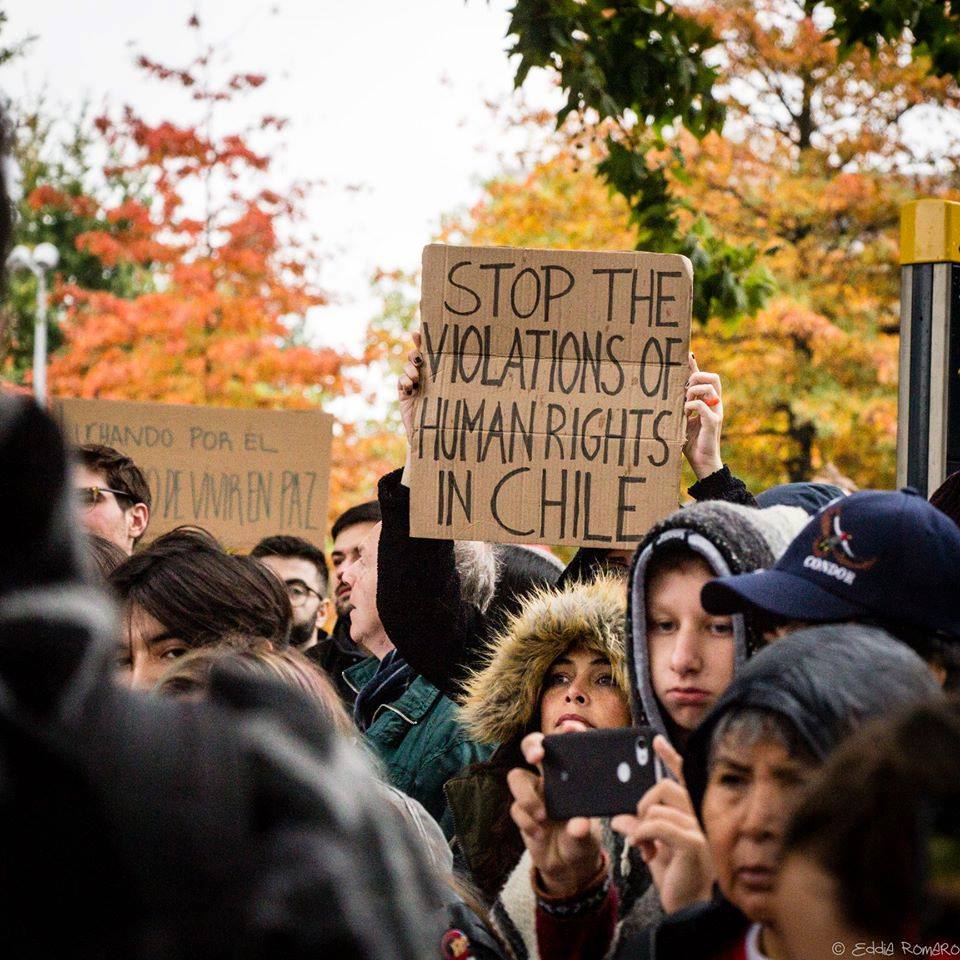
The country has a strong history of protest: in 2011, for example, students took to the streets for months on end to demand education reform, and there were extensive environmental protests during the same year. In 2016, the population mobilized against the country’s privatized pension system. The Mapuche Indigenous people, whose traditional territory is mostly in the south, have been fighting for autonomy for years. The October uprising brought all of these battles together for the first time.
“These are demands of human rights. Health, water, education –the things that are pillars of society – are not guaranteed,” Matias Orellana, 24-year-old physical education teacher from the coastal city Viña del Mar, told Toward Freedom when he visited London in February.
“It’s about dignity. We all have a story of repression, of pain. People couldn’t take it anymore and it was a revolution we were waiting for,” he said.
Those involved in the movement felt a mixture of hope and fear. On one day alone, the 25th October, more than a million people took to the capital’s streets, shouting slogans like “Chile woke up,” and “It’s not 30 pesos, it’s 30 years” – suggesting the roots of the uprising go back to the three decades of neoliberalism that have passed since the end of military rule.
Protests continued daily across Santiago and in cities across the country, peaking on Fridays when many got off work. The uprising returned with force in March after a quieter summer. On March 8, International Women’s Day, an estimated 2 million women took to the capital’s streets.
“I did not expect this explosion,” says Paula Soto, who is part of the solidarity group Asamblea Chilena en Londres. “Santiago has had a lot of violent demonstrations but [this] was unprecedented. And it was amazing how fast the protest turned to calling for constitutional change.”
After initially refusing to recognize the demands of the movement, Piñera conceded to calls for systemic change, announcing a referendum that would decide if there should be a new constitution, and how that constitution would be drafted – through a constitutional assembly, through Congress, or a mixture of both. The movement began calling for a Constituent Assembly, which would include direct participation from civil society. In November, the opposition united to back the formation of a constitutional assembly, and just last month the Senate approved a bill ensuring gender parity for the constitutional process.
It was a positive step in breaking away from the shadows of the past, but protests continued, and continued to be met with repression. Tear gas, water cannons and “non-lethal” firearms were used daily to disperse demonstrations.
“There was no time between the start of the human rights violations and the information coming out,” says Soto, who is the daughter of Chilean exiles. “The carabineros [Chile’s militarized police force] were always renowned for being extremely brutal. It was never cleaned up. There was no ‘de-Pinochet.’ The same people stayed in power with the same ideology, the same outlook.”
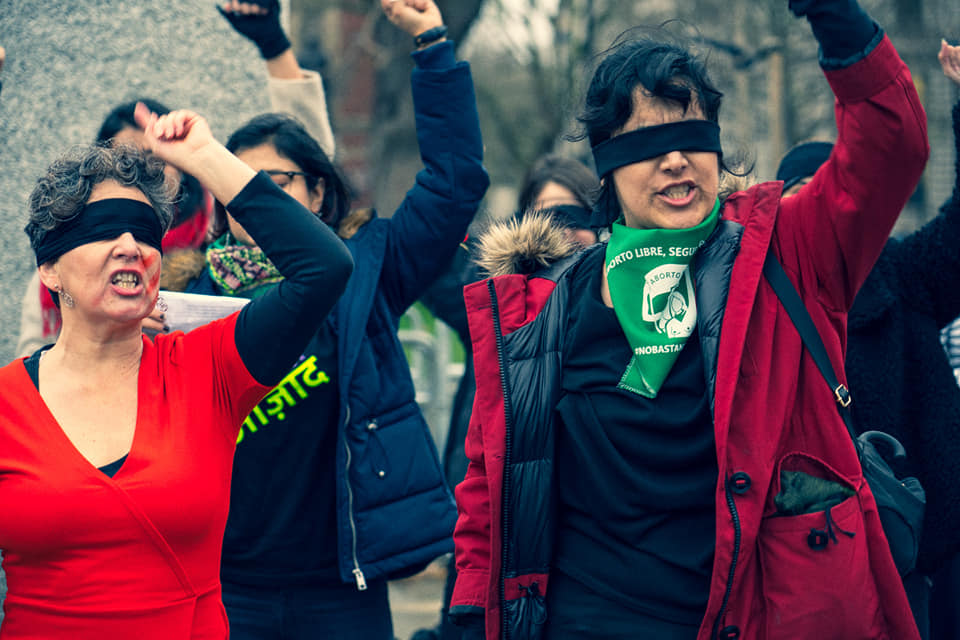
A referendum for a new Constitution was due to take place in April, with protests expected in the lead-up. But this all changed as the coronavirus pandemic reached Chile. Chileans are adjusting to life under lockdown. In mid-March, Piñera announced a 90-day “state of catastrophe,” giving the government extraordinary powers to restrict freedom of movement and support basic services and food supply.
The military has returned to the streets and in some areas you can only leave your house with a permit. Meanwhile, the referendum on the Constitution has been moved to October. With an underfunded and under-resourced public health system, and some communities unable to access drinking water because of private ownership, the pandemic is likely to bring into even greater relief the fractures in Chilean society that are at the heart of the social uprising.
A local assembly in Chile’s second city, Concepcion, released a statement calling for the government to provide healthcare “in favour of the people”, ensuring costs for treatment related to the virus are free. “The current health crisis in Chile has made it clear that all the problems we raised a few months ago were correct,” it reads. “The economic system, education system, health … are not at the service of the people but of the market.”
The 8M feminist movement have echoed the call for free medical care, paid medical leave for those caring for sick people, and a suspension of debt payments. Other campaigners have called on protesters to stay in their houses. Activists expect the social movement to return in full force once the pandemic is under control.
UK solidarity with refugees in the 70s echoes today
And then there are those who are already mourning, or healing from injuries sustained while protesting. Since October, more than 30 people have been killed in the unrest, at least six at the hands of state forces, and nearly 4,000 have been injured, according to Chile’s human rights institute. The institute has already filed more than 1,465 legal cases against the military and police for alleged violations.
These actions have been condemned by the United Nations and human rights organizations including Amnesty International and Human Rights Watch, but there has been little change. Almost 500 people have now been blinded or suffered an eye trauma because state forces have shot “non-lethal” firearms or teargas at their bodies.
Chileans thousands of miles away were desperate to help. “We were going out of our minds thinking what we can do,” Concha Bell says.
The images of the protests, the stories of people being detained, wounded and killed by state forces reawakened a solidarity movement in England that had been dormant for years.
As the messages streamed in, Concha Bell began posting on the Chile Solidarity Network’s social media channels, a group that formed in recent years to share news and support for Chileans. Soto took straight to social media too, tweeting and connecting with Chilean groups on Facebook. She joined the newly formed Assamblea Chilena en Londres after writing a petition for Chileans outside of the country to be allowed to vote for a new constitution.
The solidarity groups in England and abroad were made up of students, the children of exiles and former political prisoners.
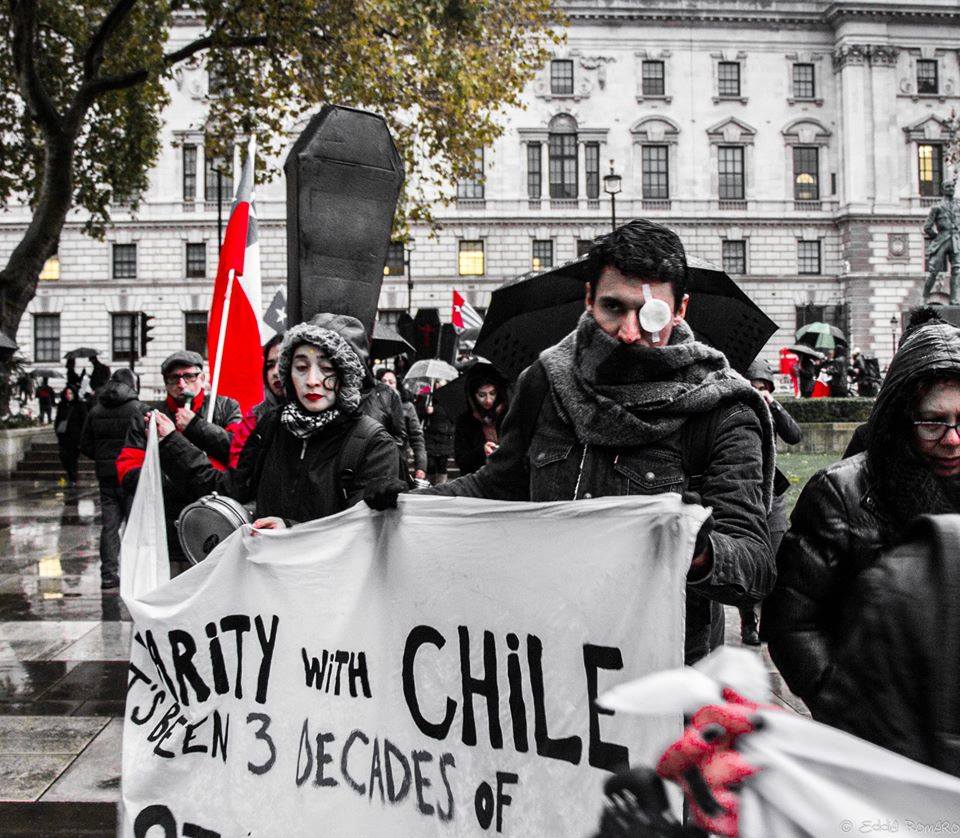
“We have older women who were political prisoners in the 1970s and fought against Pinochet and human rights violations, and now they’re back at it,” said Soto, who, as a child, fled Chile with her family in the 1970s.
In the 1970s and 80s solidarity movements rallied together in an international outcry over the coup and dictatorship. Organizations such as the Chile Solidarity Campaign and the Chile Committee for Human Rights in the UK aimed to raise awareness among the public about the injustices taking place in Chile, while trying to rally the British government into action.
Cristina Navarrete came to England as a political refugee in 1976. “Because I knew of the importance of knowing about international solidarity, when I came here we were involved for many, many years. We spent most weekends organizing events to raise money to send back to Chile. It kept the community together. It was important for Chile and important for us here as a community,” she says.
“There was incredible support and enormous solidarity at that time for the Chilean prisoners, and for the refugees that arrived, certainly in this country and in other countries in Europe.”
The UK became a home for around 2,500 Chilean refugees in the 1970s. One of the biggest campaigns was launched by the World University Service, who helped fund the education of 900 refugees. British workers were also instrumental in the solidarity movement, disrupting production in companies that continued to trade with Chile.
Dockers in Liverpool refused to unload ships that had come from Chile after the coup, while in Scotland, workers organized a boycott at a Rolls Royce factory, which serviced the engines of Hawker Hunter jets used by the Chilean air force.
The East Kilbride workers’ refusal to service the engines, led by Bob Fulton, John Keenan, Robert Somerville and Stuart Barrie, would ground much of Pinochet’s air force for years.
Though the Scottish workers didn’t know it at the time, the ripple effects of these actions were felt thousands of miles away.
In Nae Pasaran, a 2018 documentary about the boycott, director Felipe Bustos Sierra tracks down members of the Chilean air force who rejected the coup and were imprisoned. They recall how they would hear updates about the boycott when secretly tuning into Radio Moscow.
It was hugely uplifting for those on the frontlines of resistance to the dictatorship in Chile to know that people outside of the country were thinking about them.
Navarrete was a student and member of the Revolutionary Left Movement (MIR) in Santiago when the coup against Allende took place. In 1974 she was arrested, disappeared for a month and spent a year in prison camp.
She says hearing about international solidarity had a huge effect on prisoners. “It was very important for us to know we were not being forgotten, that there was universal condemnation of what was happening in Chile,” Navarrete says. “We used to receive information that there were students, trade unions, parliamentarians all over the world condemning the coup, and denouncing the human rights abuses that were taking place in Chile.”
She adds: “When I was in the concentration camp we would hear the news, have small meetings where somebody would report on everything that was going on. That was quite uplifting. It’s the idea that you’re not alone. The idea that you haven’t been forgotten.”
These same feelings are being shared by victims of state repression in Chile today. Matias Orellana came to Europe in February to meet the United Nations special rapporteur for free expression in Geneva, and connect with different solidarity groups from London to Berlin. His trip was supported by the European Solidarity Movement so he could tell his story, and so people could see the damage that was being done to the Chilean people as they pushed for change.
Recovering from months of state violence in Chile
Orellana is one of 460 people who have suffered severe eye trauma at the hands of state forces since the protests began in October. On new years eve, Orellana was hit in the face with a teargas canister as police tried to disperse a protest. Although he has taken part in protests since the outset, on that night Orellana says he was just out celebrating new years with a friend when they came across a demonstration at a central plaza.
The impact of the canister was so strong that he suffered a cranial fracture, and his eyeball exploded.
“It’s a physical and emotional trauma. In general I feel strong because I have so much support around me, but I can’t deny that some days I feel frustration and anger when I think about the injustice in Chile,” he says. “It’s important to stay in the streets, to maintain the protest, but the people continue dying, they continue to be mutilated.”
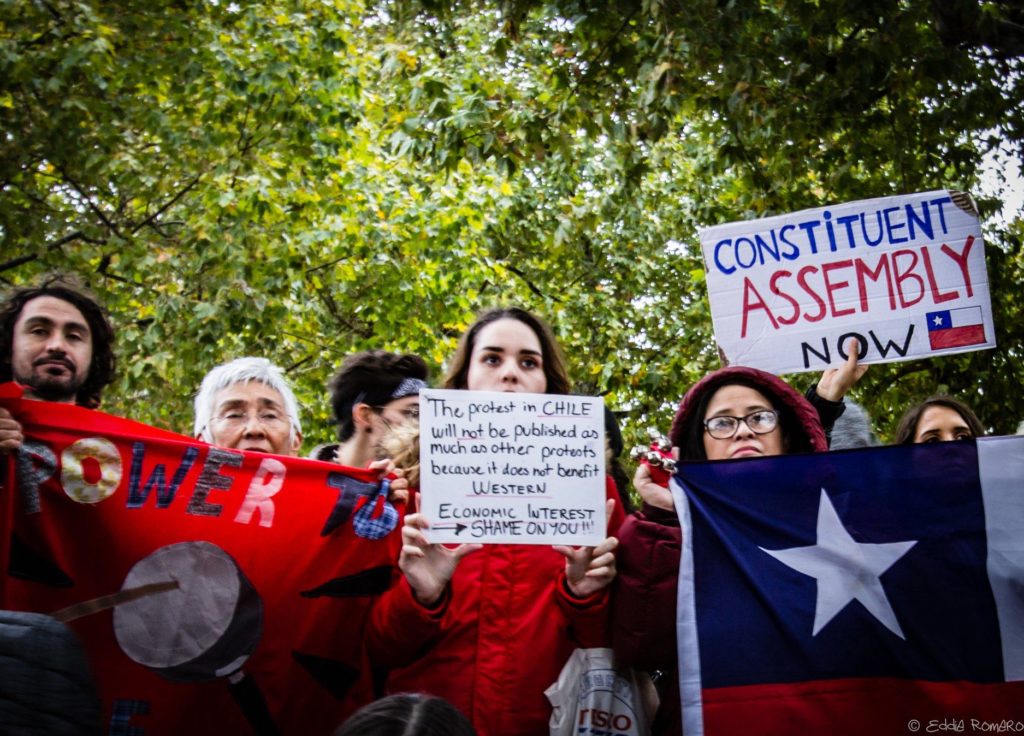
Solidarity groups have been relentlessly trying to raise visibility of what’s happening in Chile – both calling out the human rights abuses and the neoliberal model that spurred the uprising. When Concha Bell found out that Michele Bachelet, former president and current UN special rapporteur for human rights, would be visiting Cambridge University, she asked her for a statement on the Chilean situation. Her response made headlines in Chile.
The Asamblea and the Chilean Solidarity Network wrote to the British Foreign Office laying out their concerns for the people of Chile, and calling for the UK to end its trade of arms and crowd-control weapons. The UK government’s response acknowledging concerns about the situation was also shared widely in Chile.
“Generating international solidarity remains the main goal. We can’t have much effect on politics, but we can do [solidarity],” says Soto. “The other goal is to do with democratic participation, as we can vote in the referendum but we can’t elect representatives for constitutional convention.”
Concha Bell says the creativity, passion and determination of the Chilean protest movement has captivated the international community. “Their unrelenting fearlessness has really captured people. If people in Chile are willing to put their necks on the line, why would I not give an hour of my day to share a story, or get involved in an action?”
“This movement isn’t just national, there are many fronts fighting internationally,” says Orellana.
“The international community can make noise, it’s beautiful to see them on the streets here.”
As the afternoon draws in we meet in a London cafe, Orellana moves his hand to his face above his hollowed eye. He tells me he gets headaches towards the end of the day. “When I was in Chile I lost hope. I was really frustrated, seeing every week someone losing an eye,” says Orellana. “But after visiting communities here I’ll return to Chile with hope, but also with fear.”
Author Bio:
Naomi Larsson is a British-Chilean journalist who covers human rights and social justice. She was shortlisted for an Amnesty Media Award for her reporting on the Chilean uprising.
